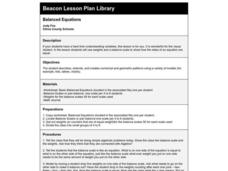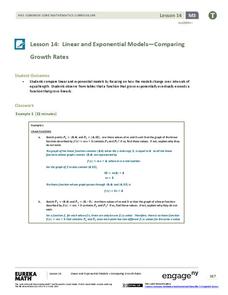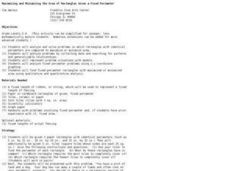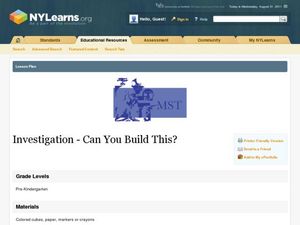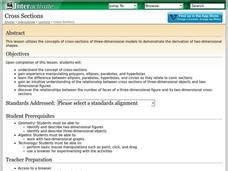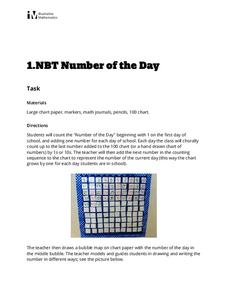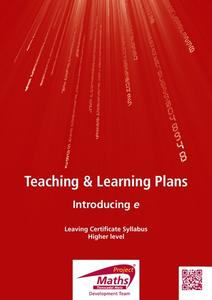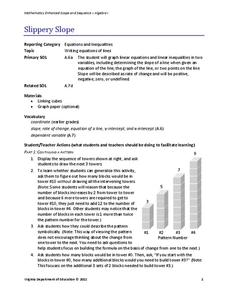Alabama Learning Exchange
Place Value Review
Here is a fast-paced addition game which reinforces the concept of place values. Learners view a PowerPoint on place value, then engage in the game using a whole-class format. This is a stimulating, and interesting math game lesson.
John Lentine
Butterflies and Bugs
Symmetry, line, shape, art, and math are all connected through a fun hands-on craft. Included are instructions to a classic activity, where learners create butterflies to show symmetry in nature and then discuss symmetry in math. It is...
Curated OER
Balanced Equations
Help your math class understand variables. This activity is for a visual learner. They will use weights and a balance scale to show how the sides of an equation are equal. Worksheet is included.
Alabama Learning Exchange
Introduction to Division
Examine how addition, subtraction, multiplication, and division relate to and are separate from each other. As they listen to the book, The Doorbell Rang, they demonstrate the math described in the story by cutting up paper cookies...
Curated OER
Global Warming
A series of independent learning activities teaches learners about global warming as it relates to economics and industrialization. The culminating project requires them to create a multimedia presentation identifying the problems,...
Curated OER
Linear Programming
Students explore inequalities to determine the optimal solution to maximize a profit for a company. In this linear programming lesson, students discover how to graph inequalities and how to determine the algebraic representation of a...
EngageNY
Similarity and the Angle Bisector Theorem
Identifying and verifying reproducible patterns in mathematics is an essential skill. Mathematicians identify the relationship of sides when an angle is bisected in a triangle. Once the pupils determine the relationship, they prove it to...
EngageNY
Sine and Cosine of Complementary Angles and Special Angles
Building trigonometric basics here will last a mathematical lifetime. Learners expand on the previous lesson in a 36-part series by examining relationships between the sine and cosine of complementary angles. They also review the...
EngageNY
Linear and Exponential Models—Comparing Growth Rates
Does a linear or exponential model fit the data better? Guide your class through an exploration to answer this question. Pupils create an exponential and linear model for a data set and draw conclusions, based on predictions and the...
Curated OER
Multiplication
Students practice their multiplication facts by reinforcement and repetition. Students write facts in their math journals, and use labeled soccer ball and deck of cards to practice multiplying by "number of the day." Play continues until...
Curated OER
Maximizing and Minimizing the Area of Rectangles Given a Fixed Perimeter
Students explore the realms of measurement. In this math lesson plan, students analyze and solve problems in which rectangles with identical perimeters are compared to maximize or minimize area. This lesson can be extended for algebra,...
Curated OER
Investigation--Can You Build This?
Early learners explore shapes using colored blocks. They first get some hands-on time with the blocks and then look at beginning math concepts regarding spatial relationships. They work with a partner to build a 6-8 block tower...
Shodor Education Foundation
Cross Sections
Use this activity on cross-sections of three-dimensional shapes in your math class to work on algebra or geometry Common Core standards. The lesson includes a list of relevent terminology, and a step-by-step process to illustrate the...
Curated OER
Inequality and the 1/2 Benchmark
Fourth graders utilize fraction bar manipulatives to compare a variety of fractions to the fraction value 1/2. Pupils are put into groups, and they begin to see how fractions that look completely different actually represent the same...
Illustrative Mathematics
Find The Numbers 0-5 or 5-10
In need of math station or center for your kindergartners? Model how to play this game with the whole class first and then make it into a center. Create a few sets of six number cards with 0-5 or 5-10 and then create a matching die with...
Illustrative Mathematics
Number of the Day
Daily routines not only help to manage classrooms, they can also provide students with rich opportunities for learning. This activity supports young learners in developing their number sense by counting up the school days on a class...
Project Maths
Introduction to e
First there was pi and now there's e. A discovery-based lesson helps learners find a pattern in compound interest as the compounding period changes. Their investigation results in the discovery of the number e. The lesson is the first in...
Curated OER
Lesson: Younger Than Jesus: Understanding, Looking at, Making Abstract Art
Before the class makes abstract art, they see contemporary examples and analyze them. They look at art made by abstract artists under the age of 33 then use similar techniques to create an interesting collection of their own. The lesson...
Virginia Department of Education
Slippery Slope
Explore slope using geometric patterns. Young mathematicians investigate towers built from cubes to develop a linear pattern. They move the data to a coordinate plane to connect the pattern to slopes.
Curated OER
Patterns in Dance
Third graders perform a line dance in the study of math as a pattern. They create and discuss movement solutions derived from movement exploration. They observe that patterns exist in the areas of music and dance and follow the...
Curated OER
Rocket Patterns
Students create their own paper rockets. They identify different patterns and practice making their own. They also discover the concept of sequences.
Curated OER
Measuring Pattern Block Angles
Sixth graders identify various angles by using pattern blocks. In this measurement instructional activity, 6th graders find out how many degrees are in each of the different angles of the various pattern blocks.
Curated OER
Representing and Extending Patterns
Students explore repeating and growing patterns. In this patterns lesson, students describe patterns, explore changing patterns and match patterns. Students participate in online activities and read books that show patterns in...
Curated OER
Describing Patterns
Fourth graders investigate repeating and growing patterns. Models, graphs and words are used to describe, extend and represent patterns. Students use evidence from models and graphs to support the identification of patterns.
Other popular searches
- Patterns in Math
- Elementary Math Patterns
- 100th Day Math Patterns
- Farm Animal Math Patterns
- Growing Patterns in Math
- Powerpoint Math Patterns
- Growing Patterns Math
- Math Patterns and Rules
- Math Patterns and Relations
- Number Patterns in Math
- Geometric Patterns in Math
- Inauguration Math Patterns


